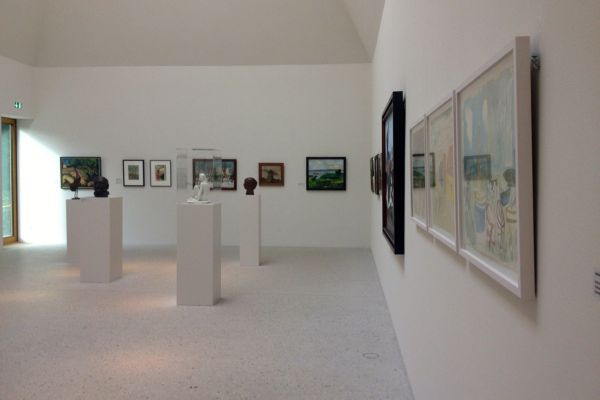Deadline: 14-Jun-23
The National Endowment for the Humanities (NEH) Division of Public Programs is accepting applications for the Public Impact Projects at Smaller Organizations program.
This program supports small and mid-sized museums and cultural organizations in the creation of public humanities programming and strengthens their capacity to develop such programming.
Purpose
- Public Impact Projects at Smaller Organizations (PIP) helps cultural organizations enhance their interpretive skillset and develop public humanities programming.
- The goal of PIP is to help you identify the interpretive potential of your humanities collections, support your staff’s interpretive ability, or launch public programs that connect with new and existing audiences. Successful projects should demonstrate how the humanities matter to audiences and communities.
When designing your project, consider the following questions:
- What are your organization’s humanities interpretive needs or programmatic goals?
- How would achieving these needs or goals benefit public audiences?
- How might these goals expand your audience reach?
- How might new approaches to interpretation enable you to engage underserved audiences?
Sample Projects
- PIP might fund projects such as:
- A tribal museum planning to update its permanent exhibitions invites interpretive specialists, historians, and elder knowledge bearers to evaluate existing programs and exhibitions. The consultants work with staff to conduct a thorough collection review and lead a workshop to think creatively about how to draw out compelling stories to engage younger visitors. A report of their findings outlines possible new narratives for interpretive programing and a timeline to create an interpretive plan.
- A local art center partners with area high schools to co-curate an exhibition about how artists, historically drawn to the town to capture its mountainous landscape, interpreted the land and community over time. Working alongside staff, local artists, art historians, and environmental historians, students help select the artwork for display, write interpretive labels, and join in a facilitated dialogue on cultural heritage as it relates to local, regional, and national identity. In addition to an exhibition in the art center, panels printed with select featured artworks and the accompanying interpretive text are displayed in downtown storefront windows.
- The staff of a rural historic house and farm, dating to the mid-eighteenth century, invites historians, an archivist, and an interpretive planner to consider new interpretation of several long-ignored structures on the grounds. They research site history, consult recent scholarship, and visit similar historic sites featuring updated interpretive approaches. Volunteer docents participate in a seminar on new methods for interpreting historic sites conducted by a professional museum association. The outcome of the project is a preliminary draft for new interpretive programs identifying approaches to be tested and including a list of resources supporting new interpretive themes.
Funding Information
- You may request up to $25,000. This includes the sum of direct and indirect costs.
- You may request a period of performance up to two years with a start date between March 1, 2024, and May 1, 2024.
- The period of performance is the span of time during which you may incur expenses to carry out the work under the award. It must start on the first day of the month and end on the last day of a month.
Activities
- Projects focused on increasing your interpretive capacity might involve staff development, evaluation, or interpretive planning. Possible activities include:
- hiring an interpretive consultant to help you think creatively about hidden strengths of your collections or generate new ideas for engagement with audiences
- working with an evaluator to conduct focus groups or front-end evaluation aimed at connecting with your surrounding community
- providing training on interpretive methods for volunteers or supporting staff
- attendance at conferences focused on new interpretive approaches and best practices
- Allowable activities include:
- consultation with scholars and interpretive consultants to develop new narrative frameworks for your collections or site
- professional development to enhance staff and volunteer skills to present and plan public programing, including attendance at professional conferences or the creation and implementation of interpreter training specifically for your organization
- front-end and formative evaluation
- long-term strategic exhibition or interpretive planning
- visits to other organizations to observe interpretive best practices planning and/or delivery of interpretive public programs
- co-curation projects that engage community members in doing the work of the humanities (e.g., primary research, oral histories, and composing interpretive content), resulting in a publicly available interpretive project, such as an exhibition or website
- development or implementation of programming to amplify the presentation of a traveling exhibition hosted at your institution (exhibition fees and shipping are not allowable costs in this program)
Eligibility Criteria
- To be eligible to apply, you must be established in the United States or its jurisdictions as one of the following organization types:
- a nonprofit organization recognized as tax-exempt under section 501(c)(3) of the Internal Revenue Code
- an accredited institution of higher education (public or nonprofit)
- a state or local government or one of their agencies
- a federally recognized Native American Tribal government
- If your organization is eligible, you may apply on behalf of a consortium of collaborating organizations. If NEH selects your proposal for funding, you will be programmatically, legally, and fiscally responsible for the award.
- The recipient may not function solely as a fiscal agent but should make substantive contributions to the success of the project.
- Individuals and other organizations, including foreign and for-profit entities, are ineligible.
For more information, visit Grants.gov.
